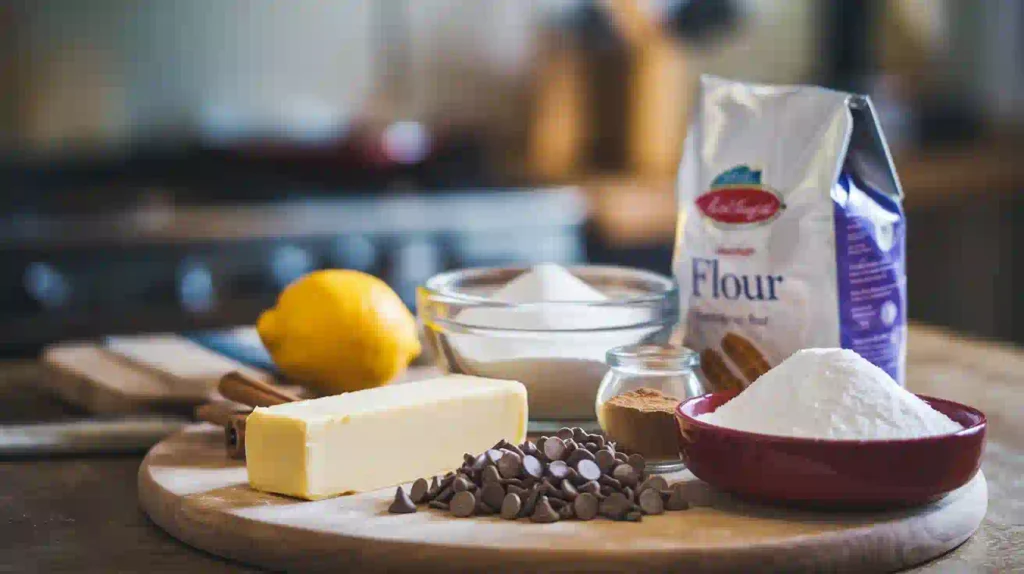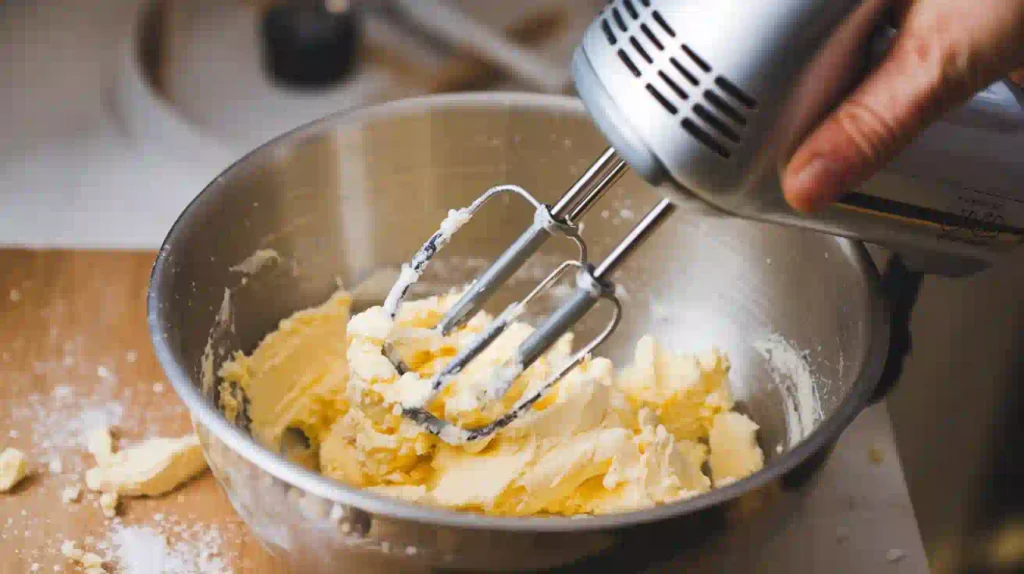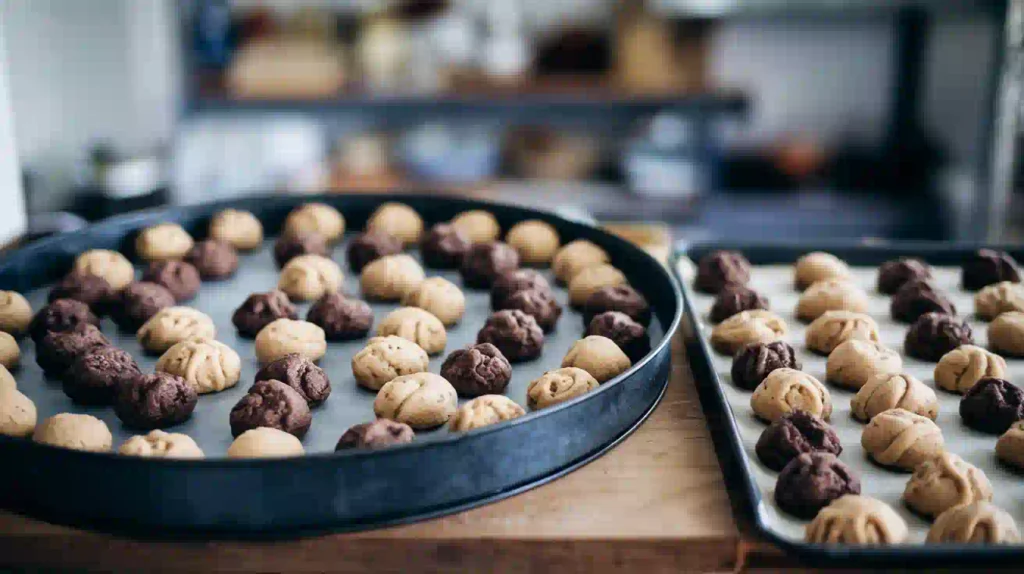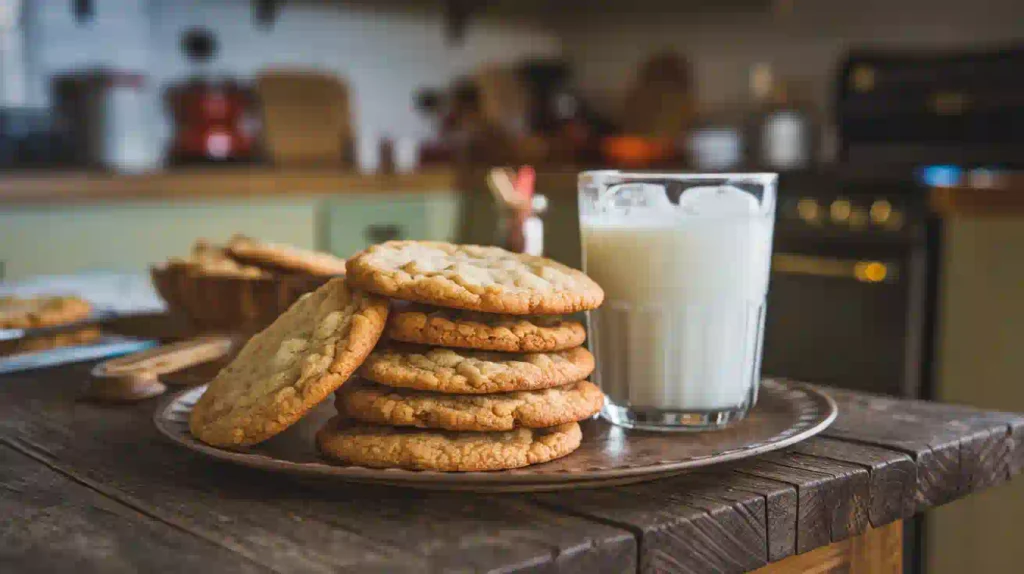
When it comes to baking cookies, the most desired texture is often soft and chewy, and the Soft and Chewy Cookies Recipe is the secret to achieving this perfect texture. These types of cookies are not only delicious but also hold a special place in everyone’s heart. The question is, how do you make soft and chewy cookies every time you bake them? With the right ingredients, methods, and tricks, it’s easier than you think. In this guide, we’ll explore the secrets and tips for baking the perfect soft and chewy cookies.
Whether you’re a seasoned baker or just starting, this recipe will ensure your cookies come out warm, soft, and irresistibly chewy every single time.
Table of contents
- Why Soft and Chewy Cookies Are the Best Cookie Recipe
- Key Ingredients for Soft and Chewy Cookies
- How to Cream Butter and Sugar for Soft and Chewy Cookies
- How Flour Affects Your Soft and Chewy Cookie Recipe
- How Eggs Impact the Texture of Soft and Chewy Cookies
- Why Brown Sugar Is Essential for Soft and Chewy Cookies
- How Chilling Dough Helps Achieve Soft and Chewy Cookies
- Baking Time for Perfect Soft and Chewy Cookies Every Time
- Common Mistakes When Baking Soft and Chewy Cookies
- Best Storage Tips for Soft and Chewy Cookie Recipes
- Alternative Ingredients for Special Dietary Needs
- Can You Freeze Dough for Soft and Chewy Cookies?
- How to Make the Dough for Soft and Chewy Cookies Ahead of Time
- RECIPE MAP
- Frequently Asked Questions
- Conclusion: The Perfect Soft and Chewy Cookies
Why Soft and Chewy Cookies Are the Best Cookie Recipe
Cookies are a universally cherished dessert, loved by people across the globe. Yet, not all cookies are equally appealing—what sets some apart from the rest? Soft and chewy cookies, with their distinct texture, deliver an irresistible experience that keeps us coming back for more. Their tender, melt-in-your-mouth quality makes them a standout favorite, offering a delightful treat that’s hard to resist.
Many people prefer this style of cookie because it’s comforting and more enjoyable. You can easily savor each bite, and the texture is perfect for dunking in milk, coffee, or hot cocoa. The secret to achieving this delightful texture lies in the right balance of ingredients, as well as baking and cooling techniques.
Key Ingredients for Soft and Chewy Cookies
To achieve that perfect soft and chewy texture, the Soft and Chewy Cookies Recipe relies on a few key ingredients. Here are the main ones:
1. Butter: The Key to Softness
For more details, see the recipe map below.
Butter is a vital ingredient for any cookie recipe, but it plays an even more significant role in creating soft, chewy cookies. Butter gives cookies flavor, richness, and helps create that soft texture. Be sure to use unsalted butter at room temperature, as it blends better with the sugars and other ingredients.

2. Brown Sugar: Adds Moisture
Brown sugar is your secret weapon for chewy cookies. The molasses in brown sugar adds moisture to the dough, which helps keep your cookies from becoming dry and crumbly. The moisture content helps to make the cookies chewy, soft, and flavorful.
3. Granulated Sugar: For Structure
While brown sugar contributes to moisture and chewiness, granulated sugar is necessary for structure. It helps the cookies spread properly and contributes to a crisp outer edge while keeping the inside soft.
4. Eggs: For Binding and Texture
Eggs bind the ingredients together and help the cookies rise. The egg yolk in particular contributes to moisture, while the egg whites add structure to the cookies. The right ratio of egg yolks and whites is essential for soft and chewy results.
How to Cream Butter and Sugar for Soft and Chewy Cookies
For the Soft and Chewy Cookies Recipe, one of the most crucial steps in cookie-making is properly creaming the butter and sugar.The goal is to incorporate air into the mixture, which helps the cookies rise slightly during baking, giving them that chewy texture.

Creaming Tips:
- Use softened unsalted butter, not melted butter.
- Beat the butter and sugar together until light and fluffy, which should take about 2-3 minutes on medium speed. The air whipped into the butter creates lightness in the dough.
- For even better results, beat the sugar and butter for 3-5 minutes, until it’s pale and smooth.
How Flour Affects Your Soft and Chewy Cookie Recipe
Flour is another key ingredient, but too much or too little can affect the texture. Using all-purpose flour gives you the right balance of structure and chewiness.
How Much Flour to Use:
- Measure your flour properly. Spoon the flour into your measuring cup and level it off to avoid using too much.
- If the dough feels too sticky, you may have added too much flour. If it’s too runny, you might need more.
How Eggs Impact the Texture of Soft and Chewy Cookies
When making cookies, the eggs are responsible for providing structure and stability, while also helping with texture. The egg yolks add richness and moisture, which is key to achieving that soft and chewy interior.
Egg Tips:
- Use room-temperature eggs for better incorporation into the dough.
- Avoid over-beating the eggs. Simply add them one at a time, and beat until incorporated.
Why Brown Sugar Is Essential for Soft and Chewy Cookies
As mentioned earlier, brown sugar is essential for chewy cookies. The reason it makes such a difference is because of the molasses content. This helps the dough retain moisture while baking, resulting in soft and chewy cookies.
If you want to increase the chewiness of your cookies even more, try using dark brown sugar instead of light brown sugar. The higher molasses content in dark brown sugar will intensify the flavor and moisture.
How Chilling Dough Helps Achieve Soft and Chewy Cookies
Chilling the cookie dough before baking is a game-changer when it comes to texture. While it might seem like an extra step, it’s an important one for getting the perfect cookie.
Why Chill the Dough?
- Chilling firms up the dough, which helps prevent excessive spreading while baking.
- The rest period allows the flour to fully hydrate, creating a thicker dough and more defined cookies.
- Chilled dough also lets the flavors develop, making your cookies taste even better.
For the best results, chill the dough for at least 30 minutes, but you can refrigerate it for up to 24 hours if you’re looking to bake it later.
Baking Time for Perfect Soft and Chewy Cookies Every Time
The next crucial step in achieving soft and chewy cookies, especially with the Soft and Chewy Cookies Recipe, is the baking time.Baking cookies for too long can result in dry, crunchy cookies, while under-baking them can make them too soft and doughy.

Baking Tips:
- Preheat your oven to 375°F (190°C), and make sure it’s fully heated before putting your cookies in.
- Bake the cookies for about 9-11 minutes, depending on the size of the dough balls.
- Take the cookies out of the oven when the edges are golden, and the center is still soft. They’ll continue to cook as they cool on the baking sheet.
Common Mistakes When Baking Soft and Chewy Cookies
Even experienced bakers can make mistakes when baking cookies. Here are some common pitfalls to avoid:
- Using cold butter: Always use room temperature butter for the best results.
- Overmixing the dough: Overmixing can cause tough cookies. Mix until everything is just combined.
- Not chilling the dough: Chilling dough prevents your cookies from spreading too much.
- Baking at the wrong temperature: Make sure your oven is preheated before baking to ensure even results.
Best Storage Tips for Soft and Chewy Cookie Recipes
Once your cookies are baked to perfection, it’s important to store them correctly to keep them fresh and chewy.
Storage Tips:
- Store the cookies in an airtight container at room temperature for up to one week.
- If you want to keep the cookies for longer, you can store them in the freezer. Just make sure they’re in a freezer-safe container.
Alternative Ingredients for Special Dietary Needs
If you have dietary restrictions or preferences, you can still enjoy soft and chewy cookies. Here are some ingredient substitutions for various needs:
- Dairy-Free: Use dairy-free butter or coconut oil as a replacement for butter, and substitute dairy-free chocolate chips.
- Gluten-Free: Use a gluten-free flour blend instead of all-purpose flour.
- Egg-Free: Use a flaxseed egg substitute or chia seeds as an egg replacement.
Can You Freeze Dough for Soft and Chewy Cookies?
Yes, you can! Freezing cookie dough is a great way to always have homemade cookies on hand.
Freezing Tips:
- Scoop the dough into individual portions and place them on a baking sheet to freeze. Once frozen, transfer the dough balls to a freezer-safe bag.
- When you’re ready to bake, simply place the frozen dough balls on a baking sheet and bake as usual. Add a couple of extra minutes to the baking time.

How to Make the Dough for Soft and Chewy Cookies Ahead of Time
Making cookie dough ahead of time is a smart way to save time, especially when you’re busy. Once your dough is ready, simply chill it in the fridge for at least 30 minutes. This helps enhance the flavor and firms up the dough, making it easier to scoop later. You can store the dough in an airtight container or wrap it tightly in plastic wrap. If you want to keep it for longer, the dough can be refrigerated for up to 24 hours.
When you’re ready to bake, take the dough out and let it soften for a few minutes if it’s too firm. Scoop out the dough and place it on a prepared baking sheet. Bake as usual, and you’ll have fresh, soft, and chewy cookies every time.
For longer storage, you can freeze the dough. Scoop it into balls and freeze them on a baking sheet. Once frozen, transfer the dough balls to a freezer-safe bag. When ready to bake, place the frozen dough on a baking sheet and bake as normal, adding an extra minute or two to the baking time.
Making dough ahead of time allows you to enjoy fresh cookies with minimal effort, perfect for when cravings strike!
RECIPE MAP

Soft and Chewy Cookies
Equipment
- Mixing Bowl
- Electric Mixer
- Baking Sheet
Ingredients
Cookie Dough
- 1 cup unsalted butter softened
- 1 cup brown sugar packed
- 1/2 cup granulated sugar
- 2 large eggs room temperature
- 2 3/4 cups all-purpose flour
- 1 tsp baking soda
- 1/2 tsp salt
- 2 tsp vanilla extract
- 2 cups chocolate chips
Instructions
- In a large mixing bowl, cream together the softened butter, brown sugar, and granulated sugar until light and fluffy.
- Add the eggs one at a time, mixing well after each addition. Stir in the vanilla extract.
- In a separate bowl, whisk together the flour, baking soda, and salt. Gradually add the dry ingredients to the wet ingredients, mixing until just combined.
- Fold in the chocolate chips, ensuring even distribution.
- Cover the dough and chill in the refrigerator for at least 30 minutes.
- Preheat the oven to 375°F (190°C). Line a baking sheet with parchment paper.
- Scoop tablespoon-sized portions of dough onto the prepared baking sheet, spacing them about 2 inches apart.
- Bake for 9-11 minutes or until the edges are lightly golden but the centers are still soft.
- Let cookies cool on the baking sheet for 5 minutes before transferring them to a wire rack to cool completely.
Notes
Frequently Asked Questions
1. Why are my cookies flat instead of chewy?
Flat cookies are a common issue, and there are a few possible reasons for this. One main cause could be using too much butter. Butter helps cookies spread, but too much of it can cause them to spread too thin, resulting in flat cookies. Another reason is not chilling the dough before baking. Chilling helps the dough firm up, preventing excessive spreading during baking and helping the cookies maintain their chewy texture. Finally, baking at too high of a temperature can cause the cookies to spread out too quickly before they have a chance to properly set, leading to flat, thin cookies. To avoid this, be sure to measure your ingredients accurately, chill the dough, and bake at the recommended temperature.
2. Can I use coconut sugar instead of brown sugar?
Yes, you can substitute coconut sugar for brown sugar in your cookie recipe. Coconut sugar is a great alternative, especially for those seeking a more natural sweetener. However, be aware that it may slightly alter the flavor and texture of the cookies. Coconut sugar has a lower moisture content than brown sugar, which could make your cookies slightly less chewy. Additionally, coconut sugar has a more caramel-like flavor, which could change the overall taste profile of your cookies. Despite these minor differences, it’s a perfectly viable substitute for a healthier or vegan option.
Conclusion: The Perfect Soft and Chewy Cookies
Now that you know all the tips, tricks, and secrets to make the perfect Soft and Chewy Cookies Recipe, it’s time to get baking! With the right ingredients, techniques, and a little patience, you can bake cookies that are perfect every time. If you’re looking for a fun and easy cookie recipe, you might also enjoy trying Cool Whip Cookies, a delightful treat that’s both simple and delicious.
Enjoy your soft and chewy cookies with a glass of milk, and share the joy of homemade baking with family and friends.
Happy baking!
Happy baking! 🍪✨

